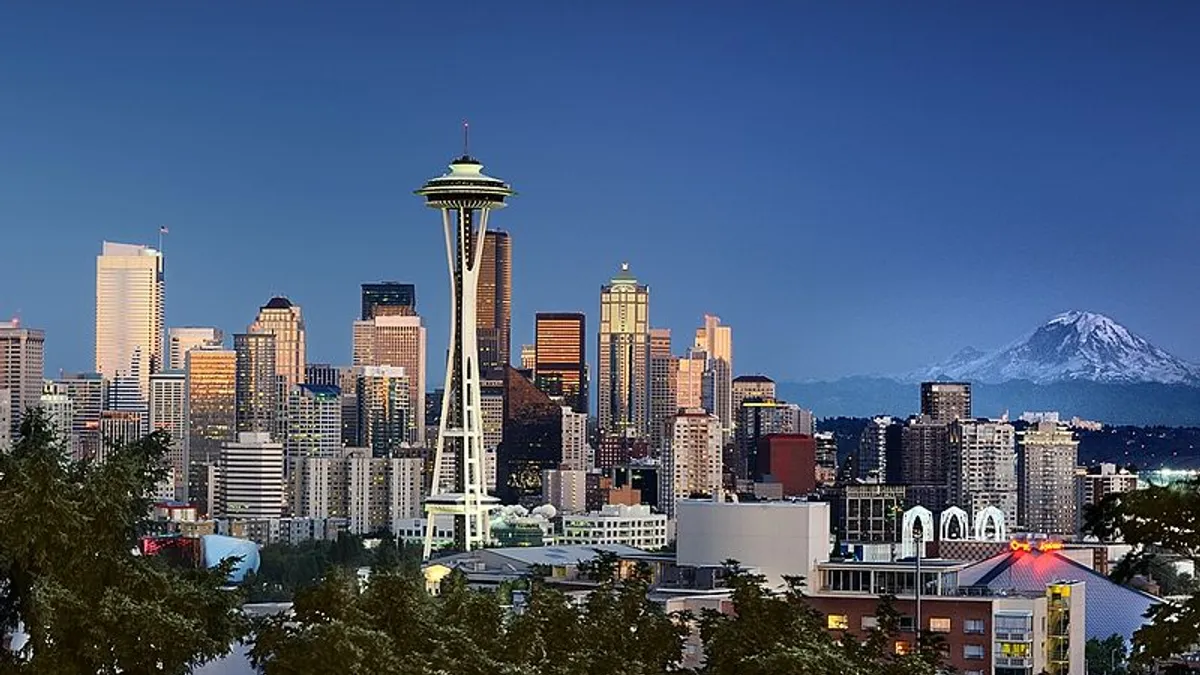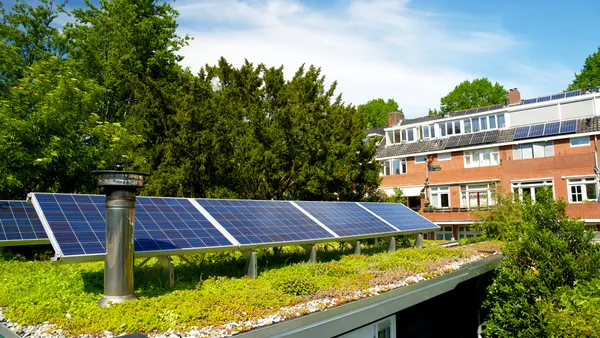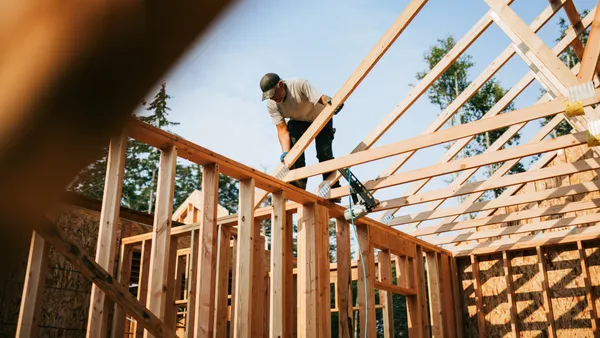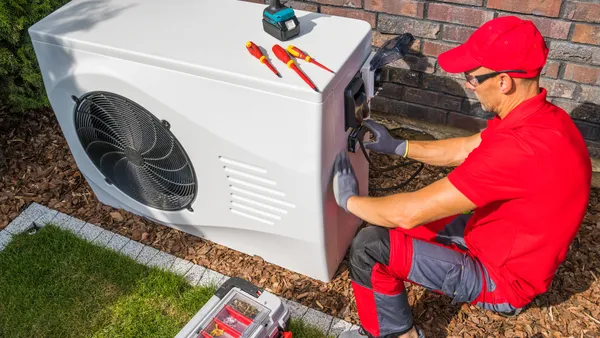UPDATED, Feb. 12, 2021: Seattle Mayor Jenny Durkan signed into law the city's new updates to its building energy code, which will go into effect next month.
"Seattle’s energy code is not only among the strongest in the nation, it prioritizes protecting the health of our most impacted populations and is a critical mechanism to support our City’s transition to a clean energy future," Durkan wrote in a statement.
The code, which applies to new commercial buildings and large multi-family buildings, will eliminate fossil fuels from most space and water heating, increase energy efficiency and increase access to onsite renewables. The city is receiving support from the Bloomberg Philanthropies American Cities Climate Challenge as it adopts the updates.
Dive Brief:
- The Seattle City Council on Monday unanimously approved Commercial Energy Code updates that will advance electrification of the city's building sector through amended insulation, space heating, water heating and lighting requirements.
- The code requires all commercial and multi-family buildings taller than three stories to wire for future electrification of appliances; increase on-site solar photovoltaics; reduce envelope heat loss and air leakage; and reduce interior lighting power allowances, among other measures. The code will also restrict fossil fuel space heating and most fossil fuel water heating systems to reduce dependence on gas and oil.
- Implementation of the space and water heating measures will take effect in January 2022, while the rest of the code will go into effect on March 15.
Dive Insight:
Electrification of the building sector has become a trend along the West Coast, particularly as jurisdictions struggle with poor air quality due to out-of-control wildfires. Berkeley made history in July 2019 as the first city to ban natural gas infrastructure in new low-rise residential buildings, sending a ripple effect across California where more than 40 cities, including San Jose, San Francisco and Oakland, have now implemented measures to push fossil fuels out of new construction.
These efforts even led California to the top of the American Council for an Energy-Efficient Economy's (ACEEE) annual State Efficiency Scorecard in December, for the first time since 2016.
The push for building electrification eventually reached Seattle, where greenhouse gas (GHG) emissions from the building sector made up 37% of the city's total core emissions in 2018 — an 8.1% increase from 2016 emission levels. In a statement to vocalize support of the energy code updates, Mayor Jenny Durkan warned that inaction would lead to a further building emissions uptick of 12% by 2050.
Seattle's energy code updates may now influence statewide action in Washington, where GHG emissions from the building sector are up 50% since 1990. To combat this pollution, Gov. Jay Inslee introduced the Healthy Homes & Clean Buildings bill in December, which would require zero-carbon new building construction in 2030 and beyond.
Some energy efficiency advocates are also anticipating California Gov. Gavin Newsom will fold proposed building electrification requirements into his state's energy efficiency standards.
Seattle's building energy code updates saw vast interest in the council's Land Use and Neigborhoods Committee meeting on Jan. 27 where local residents, as well as representatives from E2, the American Institute of Architects, the Natural Resources Defense Council and other advocacy organizations, expressed their support in the public comment period.
"When future historians look back at our time, there are going to be two issues that they're going to comment on how well did we respond," said Seattle resident Michael Ruby in the meeting, noting the first as Benjamin Franklin's challenge to maintain a republic. "The other that we really need to respond to is, how aggressively did we respond to the challenge of global warming? Did we have the courage to do the very difficult things that need to be done to actually make a difference? We need at this point to adopt the Seattle commercial energy code."
Yet the energy code updates did not have unanimous approval from the public. In that same meeting, local affordable housing developer Benjamin Maritz argued the new code can cost developers up to $15,000 more to construct their apartment buildings, which can translate to a rent increase of up to $100 per month for tenants.
"This technology does not pay for itself. It must be paid for by our city's renters who are currently experiencing both COVID and the housing crisis. This is the wrong trade off," Maritz said.
A coalition of natural gas companies in Washington and Oregon dubbed "Partnership for Energy Progress" are expected to spend $1 million on a public relations campaign to promote natural gas as part of the region's clean energy future, the Seattle Times reports. Puget Sound Energy and Cascade Natural Gas are reported as anticipated members of the coalition.
Energy efficiency advocates have dismissed cost concerns by arguing building electrification will have long-term economical benefits for nearly all cities. An October study from the Rocky Mountain Institute (RMI) found electrifying space and water heating systems alone can reduce utility costs by up to 9% annually. The study analyzed Seattle along with a number of its peers in the Bloomberg Philanthropies American Cities Climate Challenge, which are all working toward emissions reduction in their respective building sectors.












